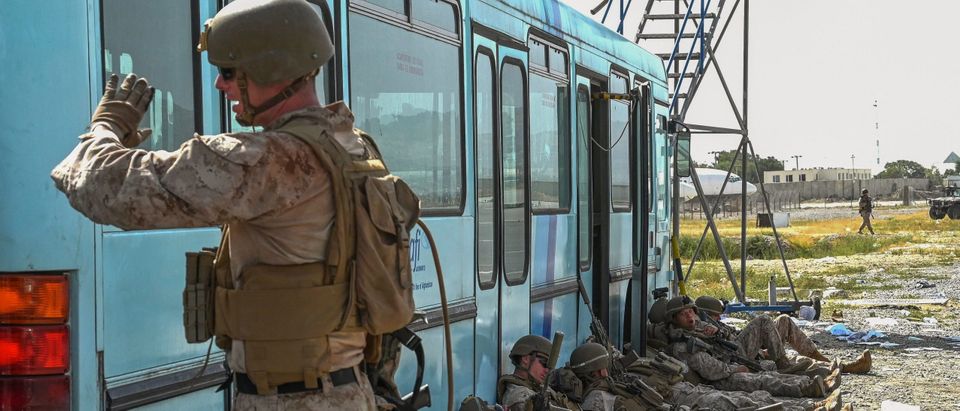Members of Congress are scrambling to provide information to constituents trapped in Afghanistan amid what Republican New York Rep. Nicole Malliotakis described as a “disorderly” response from the State Department.
Charge d’Affaires Ross Wilson is sheltering in Hamid Karzai International Airport along with the rest of the U.S.’s remaining embassy staff. However, the State Department believes that at least 10,000 Americans remain in Afghanistan, and large numbers are unable to reach the airport, which U.S. troops have secured as an evacuation site. State Department officials have issued conflicting statements on how Americans in-country should handle evacuation.
The State Department’s messaging to congressional offices Aug. 16-17 has been focused on Special Immigrant Visas (SIV), a source who had seen multiple messages told the Daily Caller. The source added that the State Department is telling those with SIVs to “wait for further instruction.” Individuals who possess SIVs are primarily interpreters and their family members. (RELATED: DOD Prepping US Military Bases To House Up To 30,000 Afghan Refugees, Americans Won’t Be Given Evacuation Priority)
Republican Iowa Rep. Ashley Hinson told the Daily Caller that her office is fielding requests from veterans who want to help the interpreters they served with escape the Taliban.
“The Administration needs a plan to protect American & Afghan lives but they haven’t offered one. It is heartbreaking to hear from Iowa veterans who are trying to help interpreters who stood shoulder to shoulder with them evacuate before it’s too late,” she said.
Republican Arkansas Sen. Tom Cotton was one of the first members to encourage Americans trapped in Afghanistan to call his office, setting up an email address to help disseminate information.
“My office has heard from over 100 Americans who need help getting out of Afghanistan,” he told The Washington Post. “We can’t fly planes or open gates, but we can at least give people information. The Biden administration needs a plan to get our fellow Americans out.”
If you’re an American stranded in Afghanistan, or know one who is, please contact my office immediately:
(501) 223-9081 or
evac@cotton.senate.govThe situation is dire, but we’ll do everything in our power to help keep you informed and to help get you out.
— Tom Cotton (@SenTomCotton) August 15, 2021
Republican Nebraska Sen. Ben Sasse described the situation as “fluid,” adding that his “office has been in contact with folks who are trying to get people out.”
“We are working to connect folks with the State Department, who is running point. Right now, the safety of Americans and our allies is of the utmost importance and we must do everything in our power to protect them,” Sasse told the Daily Caller.
The State Department has told Americans who remain in Afghanistan that they are responsible for their own safety, CBS News reported Tuesday.
The below note went out this afternoon to American citizens requesting to be evacuated from Afghanistan, @alanacbs reports. It instructs people to come to Hamid Karzai Intl Airport in Kabul, but says the US govt cannot guarantee their safety as they make the trip. @CBSNews pic.twitter.com/rgEyjGup4K
— Sara Cook (@saraecook) August 17, 2021
“The State Department is currently attempting to account for every U.S. person looking to be repatriated to the United States. We are working to confirm with the State Department that our constituents are on their list of people to be accounted for,” Malliotakis told the Daily Caller.
Malliotakis added that her office has “taken several cases of constituents who are stuck in Kabul and are attempting to get out. Some of them are U.S. citizens, including children.” She described the State Department’s response to her requests as “very unsatisfactory,” and their evacuation response “disorderly.”
A spokesman would not confirm that the State Department is instructing Americans that they are responsible for their own safety, but did confirm that it has “communicated directly with an initial tranche of U.S. citizens with specific instructions.”
“Individuals should not come to the airport until they have been notified by the Embassy via email to do so. Any U.S. citizens requesting assistance who have not already completed the Repatriation Assistance Request form on Embassy Kabul’s website should do so as soon as possible,” the spokesman said.
National security adviser Jake Sullivan refused to commit American troops in Afghanistan past Aug. 31, even if Americans and interpreters remain in-country.
“I’m not going to comment on hypotheticals,” he said at a Tuesday press briefing.












